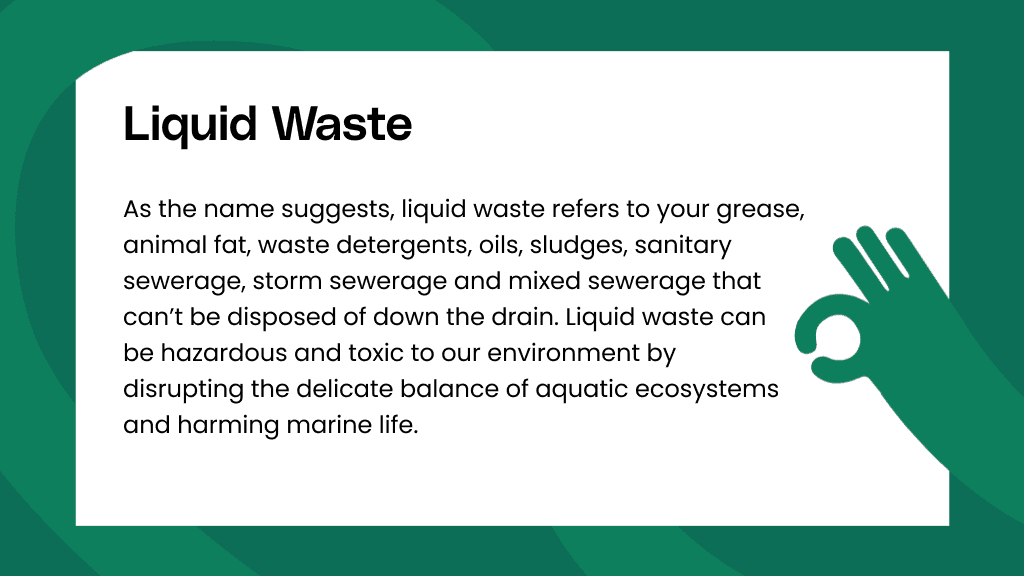How Reclaim Waste can Save You Time, Stress, and Money.
Wiki Article
Some Known Details About Reclaim Waste
Table of ContentsThe Best Strategy To Use For Reclaim WasteNot known Details About Reclaim Waste Getting My Reclaim Waste To WorkFascination About Reclaim WasteReclaim Waste Can Be Fun For Everyone
Residential sewage waste refers to the waste and items from a property septic storage tank. The proper management and disposal of domestic sewer waste require fluid waste to be transferred to a sewer treatment plant where the correct techniques and tools are used to detoxify and dispose of waste.
Commercial waste commonly consists of potential dangers, such as flammable products or a combination of fluid and solid waste products, and needs a much more innovative and comprehensive disposal process. The disposal of industrial waste commonly involves the filtration of waste before transportation to make sure risk-free and proper disposal. Hazardous waste is created from results and overflow of commercial procedures and manufacturing.
This type of waste can not utilize the exact same sewer monitoring transport or procedures as septic or business fluids. The hazardous waste administration process needs the examination and screening of fluid waste prior to it undertakes the disposal procedure (liquid waste disposal melbourne). Runoff waste is the liquid waste that originates from drainage and excess stormwater in very booming locations or cities
Drainage waste can trigger contamination and flooding otherwise managed appropriately. Discover more about sewer cleansing and waste monitoring. Making sure appropriate waste administration can avoid disasters and lower ecological damage. Both individuals in domestic setups and professionals in commercial or manufacturing sectors can take advantage of comprehending the processes and laws of fluid waste management.
The Best Guide To Reclaim Waste
Get in touch with PROS Solutions today to find out about our waste management and disposal solutions and the proper methods to care for the liquid waste you generate.(https://www.tripadvisor.in/Profile/reclaimwaste1)Do you know what happens to your water when you disengage, flush the commode or drain the cleaning device? No? Well, it deserves understanding. This supposed 'wastewater' is not only an important source but, after therapy, will be released to our land, rivers or the sea. Used water from commodes, showers, bathrooms, kitchen sinks, washings and industrial procedures is called wastewater.

water utilized to cool down machinery or tidy plant and equipment). Stormwater, a type of wastewater, is drainage that flows from farming and city areas such as roof coverings, parks, gardens, roads, courses and gutters into stormwater drains pipes, after rainfall. Stormwater flows without treatment straight to local creeks or rivers, ultimately getting to the ocean.
The Basic Principles Of Reclaim Waste
In Queensland, the majority of wastewater is dealt with at sewage treatment plants. Wastewater is carried from domestic or industrial websites via a system of drains and pump stations, known as sewerage reticulation, to a sewer therapy plant.The Department of Natural Resources recommends local federal governments concerning handling, operating and maintaining sewage systems and therapy plants. In unsewered areas, local federal governments might need householders to mount private or home sewer therapy systems to treat residential wastewater from bathrooms, kitchen areas, restrooms and laundries. The Division of Natural Resources authorises the use of household systems when they are confirmed additional reading to be efficient.
Most stormwater obtains no treatment. In some new communities, treatment of some stormwater to remove clutter, sand and gravel has actually begun using gross contaminant traps. Wastewater treatment takes place in 4 stages: Removes solid issue. Larger solids, such as plastics and various other items wrongly released to sewers, are removed when wastewater is passed via screens.
Wastewater then flows right into large storage tanks where solids settle and are eliminated as sludge. Oil and scum are skimmed from the surface. Makes use of tiny living microorganisms referred to as micro-organisms to break down and eliminate continuing to be dissolved wastes and fine bits. Micro-organisms and wastes are included in the sludge. Removes nitrogen and phosphorus nutrients that might cause algal blooms in our waterways and intimidate aquatic life.
Reclaim Waste Can Be Fun For Everyone
Nutrient removal is not readily available at all sewer therapy plants since it requires expensive specialized tools. Clear fluid effluent created after treatment might still have disease-causing micro-organisms - liquid waste disposal.
This typically means wastewater needs to be treated or contaminants gotten rid of before it can be discharged to rivers. Many wastewater flows right into the sewerage system. Under the Act, neighborhood governments administer authorizations and licences for eco appropriate tasks (Ages) involving wastewater launches that might have a neighborhood impact. The division administers authorizations and permits to Ages involving wastewater launches that might have a local or statewide impact.
Not known Facts About Reclaim Waste
Otherwise, samples are considered research laboratory evaluation. Usually lots of examinations are required to establish the levels of each of the different contaminants such as oils, heavy metals and pesticides in water. Tracking gives valid details about water quality and can verify that licence conditions are being satisfied. The info acquired with surveillance gives the basis for making water top quality choices.Report this wiki page